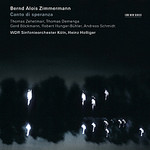
Zimmermann: Canto di Speranza
 $40.00
Out of Stock
$40.00
Out of Stock6+ weeks add to cart
BERND ALOIS ZIMMERMANN
Zimmermann: Canto di Speranza
Thomas Demenga (violoncello) Thomas Zehetmair (violin) Gerd Bockmann (speaker) / WDR Sinfonieorchester Koln / Heinz Holliger
[ ECM Records / CD ]
Release Date: Thursday 1 January 2009
This item is currently out of stock. It may take 6 or more weeks to obtain from when you place your order as this is a specialist product.
"The 1957 'cantata' for cello and orchestra, Canto di Speranza...has the focus and economy that Zimmermann's later music sometimes lost; Thomas Demenga's performance of the solo part maintains that purity even under the greatest pressure." (BBC Music March 2009)
"The synthesis of Bartók, Schoenberg and Stravinsky in the sparky Violin Concerto of 1950, played with expressive intelligence by Thomas Zehetmair, seems light years away from the deep pessimism of Zimmermann's final work, the 'ecclesiastical action' Ich wandte mich und sah an alles Unrecht, das geschah unter der Sonne (So I returned, and considered all the oppressions that are done under the sun)... the 1957 'cantata' for cello and orchestra, Canto di Speranza. ...has the focus and economy that Zimmermann's later music sometimes lost; Thomas Demenga's performance of the solo part maintains that purity even under the greatest pressure." (BBC Music March 2009)
Three keyfigures from ECM's contemporary music roster - Heinz Holliger, Thomas Zehetmair, and Thomas Demenga - team up for an exceptional recording of three works by German post-war composer Bernd Alois Zimmermann. Zimmermann, almost half a generation older than the serialists such as Boulez and Stockhausen, integrated state-of-the-art compositional methods in his writing while constantly following his own independent, highly expressive musical language. The rhythmically energetic violin concerto (1950) which is partially based on twelve-tone models and cast in three movements, was soon hailed as a model for a post-war solo concerto, while "Canto di Speranza" (1953/57), a one-movement cello concerto, acccording to Zimmermann, emphasizes monologue and introvert meditation. "Ich wandte mich…" on the other hand is Zimmermann's last work, finished only a few days before his suicide in 1970. Labelled by the composer as an "ecclesiastical action", the 35-minute oratorio on biblical verse and the famous parable "The Grand Inquisitor" from Dostoevsky's "Brothers Karamazov" is a deeply pessimistic "performance art" work - of the kind that flourished in Germany's 'Fluxus' scene around 1970 - involving recitation, singing, and both gestural and acrobatic action.
Tracks:
Konzert (1950)
für Violine und großes Orchester
Meiner Frau
Sonata. Allegro moderato, rubato
Fantasia. Rubato molto
Rondo. Allegro con brio
Canto di speranza (1952/57)
Kantate für Violoncello und kleines Orchester
Meiner Frau
Ich wandte mich und sah an alles Unrecht, das geschah unter der Sonne (1970)
Ekklesiastische Aktion für zwei Sprecher, Bass-Solo und Orchester
